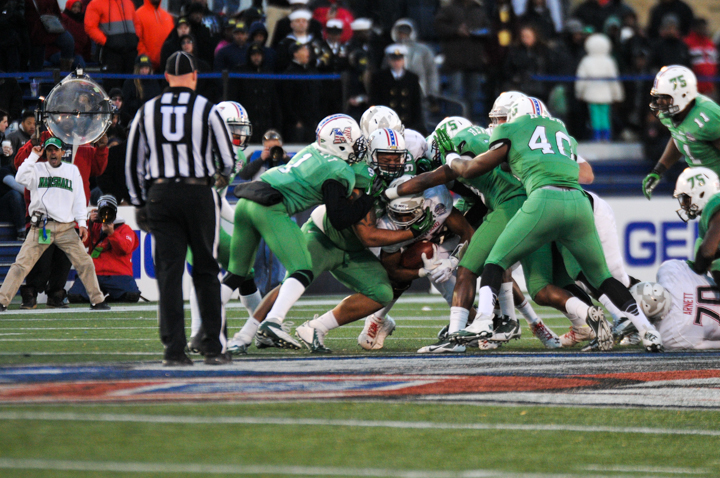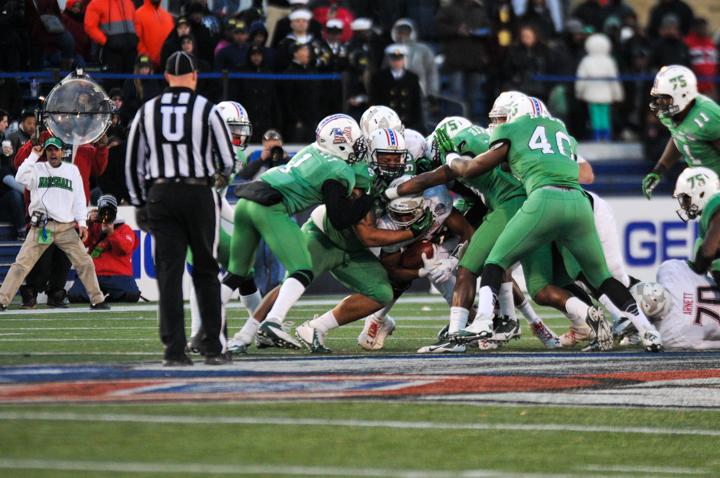ANNAPOLIS — In its first postseason appearance since 2010, the Terrapins football team fell to Marshall, 31-20, in the Military Bowl. The Terps struggled to contain the Thundering Herd in the final 10 minutes of the game and gave up 14 straight points in the fourth quarter. Here are some takeaways:
1) NOT GRITTY ENOUGH
It’d be hard to blame the Terps defense for being a bit bummed when the team drew Marshall as its bowl opponent. The Thundering Herd averaged 43 points per game in the regular season and its no-huddle offense is grueling to contend with.
But the Terps defense, as it has in the final third of the season, held its own for much of the game and Marshall scored just 17 points through the first 47 minutes.
Eventually, though, the Terps defense collapsed. Perhaps fatigue set in after defending Marshall’s up-tempo offense all game long, or perhaps the Thundering Herd made a tactical adjustment, but whatever the reason, the Terps allowed two touchdowns in the fourth quarter and let the game slip away.
It was an inability to get Marshall off the field on third down that served as the Terps’ Achilles’ heel. On the Thundering Herd’s go-ahead touchdown drive midway through the fourth quarter, it converted a third-and-12. Then it added insurance after converting on a third-and-11 with less than five minutes to play.
“It’s very frustrating, but it’s nothing that we haven’t been through before,” defensive end Andre Monroe said. “You have to keep going, keep fighting, don’t give up.”
On both of those third-down plays, Marshall quarterback Rakeem Cato made pinpoint throws under pressure to extend drives. That meant a gassed defense would have to stay on the field, and the Thundering Herd took advantage by finding the end zone twice to ultimately bury the Terps.
2) ESTABLISHING THE RUN
Coach Randy Edsall and offensive coordinator Mike Locksley have stressed the importance of a balanced offense all season, and the Terps seemed to enter the game determined to establish the run before using their passing attack.
As a team, the Terps had 194 rushing yards on a season-high 49 attempts, and six Terps had at least one carry. Running back Brandon Ross led the team with 116 yards on 20 carries.
But it wasn’t just the Terps’ success on the ground that was significant, it was also their commitment to wearing down the Marshall defense with the running game. In the first quarter, the Terps had 11 called rushing plays and just four called passing plays, with C.J. Brown going 3-of-3 for 51 yards through the air.
“One of the big things we wanted to do coming into the game was to establish the run,” Ross said. “We knew Marshall was going to come into the game throwing, moving the ball down the field. So we wanted to come into the game and keep our ‘D’ off the field for as long as we could.”
The Terps’ plan worked as they controlled the ball for about seven more minutes than Marshall. It didn’t produce results on the scoreboard, though.
They scored just 20 points and struggled mightily in the red zone, ending the first half with a pair of field goals on drives that stalled inside the 20-yard line. While attempting just eight passes in the first half — 24 for the game — the Terps didn’t connect for a long touchdown that served as a game-changer, either.
So that leaves the Terps with a conundrum moving forward. The team proved it can run the ball well enough to control the clock against a good team, but if the Terps aren’t making big plays down the field through the air or converting those drives into seven points, is committing to the run the right thing to do?
3) ONE BIG PLAY
So often in football, one big play will alter a game drastically. One late turnover, long touchdown or big return will sometimes be the key in deciding an outcome.
Against Marshall, the Terps never made that defining play. Defensive coordinator Brian Stewart’s unit, known for its consistent pressure, failed to force a turnover, and the offense was shut out in the game’s final 10 minutes.
Granted, the Thundering Herd did make it tough on the Terps by taking care of the ball and giving them difficult field position to work with. Marshall punter Tyler Williams pinned the Terps inside their own 5-yard line on three different occasions, which certainly didn’t bode well for Brown and the offense.
Still, the Terps were in the game late and nobody made a game-changing play. So what they need is dynamically talented playmakers with a confidence to make plays down the stretch. Players like injured wide receivers Stefon Diggs and Deon Long, perhaps.
4) WHAT IT MEANS
The Terps were in a bowl game for the first time in Edsall’s tenure, they finished the season with a winning record, and they got some much-needed exposure with the Military Bowl appearance.
And while the Terps aren’t thrilled by an 11-point defeat, they played a respectable game against a potent opponent. All in all, players and coaches seem to agree the Terps move into the Big Ten next with a program moving in the right direction.
So Terps fans shouldn’t sulk about the loss. They should be excited for what lies ahead: more nationally televised contests, tougher competition and — if the Terps can patch up some deficiencies like their third-down defense and remain healthy so their game-changing players stay on the field — potentially more appearances in late December. Or even January.
Running back Brandon Ross pushes a pack of Marshall defenders in the Terps’ 31-20 loss to Marshall in the Military Bowl on Dec. 27, 2013 at Navy-Marine Corps Memorial Stadium in Annapolis.





